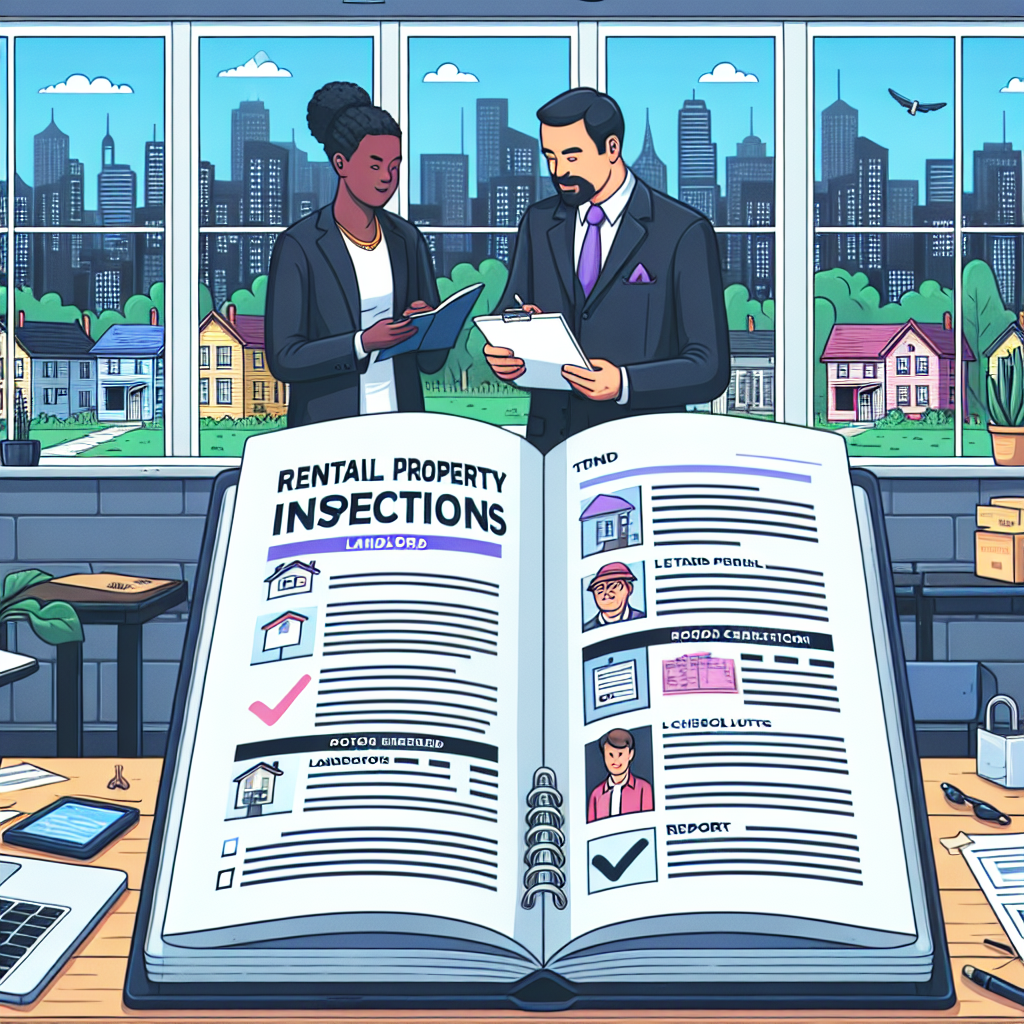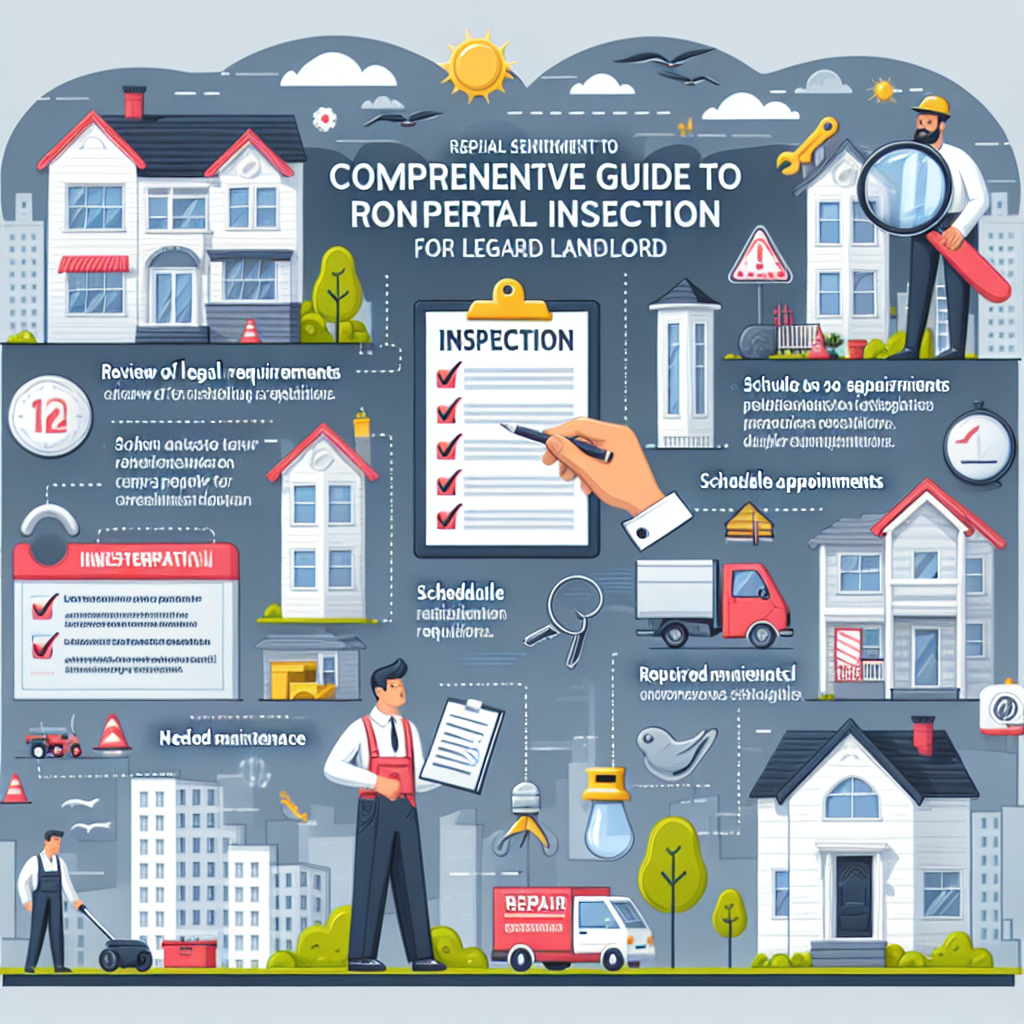-
Table of Contents
- Comprehensive Guide to Rental Property Inspections for Landlords
- Why Rental Property Inspections Are Important
- Types of Rental Property Inspections
- Move-In Inspection
- Routine Inspection
- Drive-By Inspection
- Move-Out Inspection
- Emergency Inspection
- Best Practices for Conducting Rental Property Inspections
- Use a Standardized Checklist
- Document Findings Thoroughly
- Communicate Clearly with Tenants
- Address Maintenance Issues Promptly
- Follow Legal Requirements
- Legal Considerations for Rental Property Inspections
- Notice Requirements
- Tenant Privacy
- Lease Agreement Provisions
- Handling Disputes
- Case Studies and Examples
- Case Study 1: Preventing Costly Repairs
- Case Study 2: Ensuring Tenant Compliance
- Case Study 3: Enhancing Tenant Satisfaction
- Statistics on Rental Property Inspections
- Conclusion
Comprehensive Guide to Rental Property Inspections for Landlords

Rental property inspections are a crucial aspect of property management that can significantly impact the success and profitability of a rental business. For landlords, conducting regular and thorough inspections helps ensure that properties are well-maintained, tenants are satisfied, and potential issues are addressed promptly. This comprehensive guide will provide landlords with valuable insights into the importance of rental property inspections, the different types of inspections, best practices, and legal considerations.
Why Rental Property Inspections Are Important
Rental property inspections serve multiple purposes, all of which contribute to the overall health and profitability of a rental business. Here are some key reasons why inspections are essential:
- Maintaining Property Condition: Regular inspections help identify maintenance issues early, preventing minor problems from becoming costly repairs.
- Ensuring Tenant Compliance: Inspections ensure that tenants are adhering to the terms of the lease agreement, such as maintaining cleanliness and not causing damage.
- Protecting Investment: By keeping the property in good condition, landlords protect their investment and maintain or increase property value.
- Enhancing Tenant Satisfaction: Addressing maintenance issues promptly can lead to higher tenant satisfaction and retention rates.
- Legal Compliance: Regular inspections can help landlords comply with local housing regulations and avoid legal disputes.
Types of Rental Property Inspections
There are several types of rental property inspections that landlords should be familiar with. Each type serves a specific purpose and is conducted at different stages of the tenancy.
Move-In Inspection
The move-in inspection is conducted before a new tenant takes possession of the property. This inspection documents the property’s condition at the start of the tenancy, providing a baseline for future comparisons.
- Purpose: To document the property’s condition and identify any pre-existing issues.
- Process: Both the landlord and tenant should walk through the property together, noting any damages or areas of concern on a move-in checklist.
- Documentation: Take photos or videos to supplement the written checklist.
Routine Inspection
Routine inspections are conducted periodically throughout the tenancy to ensure the property is being properly maintained and to identify any maintenance issues.
- Purpose: To monitor the property’s condition and address any maintenance needs.
- Frequency: Typically conducted every 3-6 months, depending on the lease agreement and local regulations.
- Process: Schedule the inspection with the tenant in advance and use a standardized checklist to ensure consistency.
Drive-By Inspection
Drive-by inspections are informal inspections conducted from the exterior of the property. These inspections are useful for monitoring the property’s exterior condition and ensuring that tenants are maintaining the yard and exterior areas.
- Purpose: To check the exterior condition of the property and ensure compliance with lease terms.
- Frequency: Can be conducted more frequently than routine inspections, such as monthly or quarterly.
- Process: Drive by the property and visually inspect the exterior. Note any issues that require further attention.
Move-Out Inspection
The move-out inspection is conducted when a tenant vacates the property. This inspection compares the property’s condition at move-out to its condition at move-in, determining if any damages or excessive wear and tear have occurred.
- Purpose: To assess the property’s condition and identify any damages caused by the tenant.
- Process: Conduct the inspection with the tenant present, if possible, and use the move-in checklist for comparison.
- Documentation: Take photos or videos to document any damages or issues.
Emergency Inspection
Emergency inspections are conducted in response to urgent situations, such as suspected property damage, safety concerns, or tenant complaints.
- Purpose: To address immediate concerns and ensure the safety and security of the property and tenants.
- Process: Notify the tenant as soon as possible and conduct the inspection promptly.
- Documentation: Record any findings and take appropriate action to resolve the issue.
Best Practices for Conducting Rental Property Inspections
To ensure that rental property inspections are effective and efficient, landlords should follow these best practices:
Use a Standardized Checklist
A standardized checklist helps ensure consistency and thoroughness during inspections. The checklist should cover all areas of the property, including:
- Interior rooms (e.g., living room, bedrooms, kitchen, bathrooms)
- Exterior areas (e.g., yard, driveway, garage)
- Appliances and fixtures
- Plumbing and electrical systems
- Safety features (e.g., smoke detectors, fire extinguishers)
Document Findings Thoroughly
Thorough documentation is essential for protecting both the landlord and tenant. Use written notes, photos, and videos to record the property’s condition and any issues identified during the inspection.
Communicate Clearly with Tenants
Clear communication with tenants is crucial for successful inspections. Provide tenants with advance notice of upcoming inspections, explain the purpose of the inspection, and address any concerns they may have.
Address Maintenance Issues Promptly
Promptly addressing maintenance issues identified during inspections helps prevent further damage and demonstrates to tenants that their concerns are taken seriously. This can lead to higher tenant satisfaction and retention rates.
Follow Legal Requirements
Landlords must comply with local laws and regulations regarding rental property inspections. This includes providing proper notice to tenants, respecting tenants’ privacy, and adhering to any specific inspection requirements.
Legal Considerations for Rental Property Inspections
Landlords must be aware of the legal considerations surrounding rental property inspections to avoid potential disputes and legal issues. Here are some key legal considerations:
Notice Requirements
Most jurisdictions require landlords to provide tenants with advance notice before conducting an inspection. The notice period can vary, but it is typically 24-48 hours. Check local laws to determine the specific notice requirements in your area.
Tenant Privacy
Tenants have a right to privacy, and landlords must respect this right when conducting inspections. Inspections should be conducted at reasonable times and with the tenant’s consent, except in emergency situations.
Lease Agreement Provisions
The lease agreement should include provisions regarding property inspections, such as the frequency of routine inspections and the notice period required. Both landlords and tenants should be aware of and adhere to these provisions.
Handling Disputes
If a dispute arises regarding the findings of an inspection, landlords should handle the situation professionally and fairly. This may involve providing additional documentation, negotiating with the tenant, or seeking mediation or legal assistance if necessary.
Case Studies and Examples
To illustrate the importance and impact of rental property inspections, let’s look at a few case studies and examples:
Case Study 1: Preventing Costly Repairs
A landlord conducted a routine inspection of a rental property and discovered a small leak under the kitchen sink. The tenant had not reported the issue, assuming it was minor. By identifying the leak early, the landlord was able to repair it promptly, preventing water damage to the cabinets and flooring. This proactive approach saved the landlord thousands of dollars in potential repair costs.
Case Study 2: Ensuring Tenant Compliance
During a routine inspection, a landlord discovered that a tenant had violated the lease agreement by keeping a pet in the property without permission. The landlord addressed the issue with the tenant, who agreed to remove the pet and pay for any damages caused. Regular inspections helped the landlord enforce lease terms and maintain the property’s condition.
Case Study 3: Enhancing Tenant Satisfaction
A tenant reported a malfunctioning HVAC system during a routine inspection. The landlord promptly arranged for repairs, ensuring the tenant’s comfort and satisfaction. As a result, the tenant renewed their lease for another year, reducing vacancy and turnover costs for the landlord.
Statistics on Rental Property Inspections
Statistics highlight the importance of rental property inspections in property management:
- A survey by Buildium found that 84% of property managers conduct routine inspections to ensure property maintenance and tenant compliance.
- According to the National Association of Residential Property Managers (NARPM), regular inspections can reduce maintenance costs by up to 20% by identifying issues early.
- A study by the Institute of Real Estate Management (IREM) found that properties with regular inspections have higher tenant satisfaction rates and lower turnover rates.
Conclusion
Rental property inspections are a vital component of effective property management. By conducting regular and thorough inspections, landlords can maintain their properties, ensure tenant compliance, protect their investments, and enhance tenant satisfaction. Following best practices and adhering to legal requirements will help landlords conduct successful inspections and avoid potential disputes. Ultimately, a proactive approach to property inspections can lead to a more profitable and smoothly run rental business.
In summary, landlords should prioritize rental property inspections as part of their property management strategy. By understanding the different types of inspections, following best practices, and being aware of legal considerations, landlords can ensure their properties remain in excellent condition and their tenants are satisfied. Regular inspections not only protect the landlord’s investment but also contribute to a positive rental experience for tenants, fostering long-term, mutually beneficial relationships.








